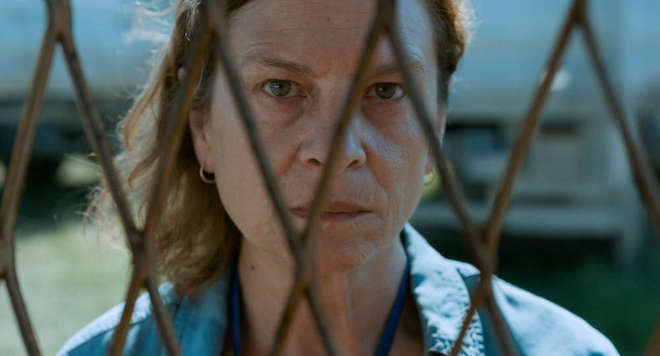Quo Vadis, Aida?
 Miss Lumière •
Miss Lumière •  Tuesday, February 15, 2022
Tuesday, February 15, 2022 Bosnian war crimes ... The Srebrenica massacre ... The fruitless struggle to save a family ... Failure of the United Nations and NATO ... Europe's worst bloodshed since WW11 ... Miss Lumière at the cinema
 Aida, local school teacher and UN interpreter
Aida, local school teacher and UN interpreter
Quo Vadis, Aida? is a stunning, visceral account of the immediate lead-up to the infamous 1995 massacre of 8,372 civilians in Srebrenica, seen through the eyes of UN translator Aida Selmanagić.
Based on real events depicted in Hasan Nuhanović's book Under The UN Flag and directed with pace and grace by Jasmila Žbanić, it mercilessly exposes both the impotence and incompetence of the UN in preventing the preventable.
Jasna Đuričić as Aida, gives a barely contained operatic performance of mother love (and courage) in extremis.
The action revolves around her increasingly desperate attempts to protect her husband Nihad (Izudin Bajrović) and two teenage sons Hamdija (Boris Ler) and Sejo (Dino Bajrović) in the face of an imminent catastrophe and an absent chain of UN command.
The film opens three and half years after the beginning of the Bosnian war, as encroaching Serbian forces are shelling the small mountain town of Srebrenica.
This is despite the area being an official "UN-protected zone".
The Bosnian Serb army are led by the ruthless, publicity-seeking General Ratko Mladić, convincingly played by Boris Isaković.
Mladić was later convicted of genocide, war crimes and crimes against humanity by the International Criminal Tribunal for the former Yugoslavia in The Hague.
In scenes chillingly reminiscent of the recent fall of Kabul when allied forces withdrew, the Muslim population of Srebrenica clamour towards the UN base camp, clutching their meagre possessions.
Amid the dusty chaos, only 4,000 people of some 30,000 are admitted in.
Terror and urgency infuse these scenes of mass panic, as the director compels the audience to bear witness.
It is both impossible to look, and to look away, thanks to cinematographer Christine A. Maier who captures the cost of the UN failure to protect civilians from the onslaught of the Bosnian Serb army in penetrating close-ups and rollicking wide shots.
The spoils of war (indignity, dispossession, displacement, death) are writ large in the many faces she so lovingly features throughout Quo Vadis.
While the UN-mandated Dutch military commander in Srebrenica Colonel Thom Karremans (Johan Heldenbergh) repeatedly assures those seeking refuge that a NATO air strike will protect them, no such intervention ensues.
It appears all those in charge at the UN are "vacationing".
Meanwhile, General Mladić and his band of un-merry men have taken over the town and bullied their way into the UN compound looking for "soldiers".
Karremans later reveals he has been told not to "piss off the Serbs" and hides in his office.
As Aida tries everything to ensure her family are included on the UN list of evacuees, rather than those being separated by gender, herded onto buses and transported to a "safer place" in East Bosnia, the tension and fear escalate.
Sadly, we know the end of the story. It's the same story and same end throughout human history. Fanaticism, fascism, slaughter.
The way Žbanić directs this moment is nothing short of masterful.
We see hundreds of men and boys being marched behind the UN camp offices and locked in a makeshift cinema, among them Aida's husband and sons.
"Now you will see the real film," says one Serbian soldier.
The camera slowly pulls back to show the exterior of the building. All is still, almost bucolic, until the gunfire.
But perhaps the most profoundly affecting scene occurs when Aida returns to Srebrenica many years later to take up her old position as a teacher at the local school.
The remains of those shot and buried in mass graves have been disinterred and laid out for identification.
As Aida and other women walk silently between the grim fragments, we wait for the terrible moment of recognition.
When it comes, the human cost of Srebrenica is both palpable and unfathomable.
*Quo Vadis, Aida? won the 2021 European Film Award for Best Film, Best Director and Best Actress and was nominated as Best International Feature Film at the 2021 Academy Awards. It is screening now in limited release.
 Critics Corner
Critics Corner 








Reader Comments